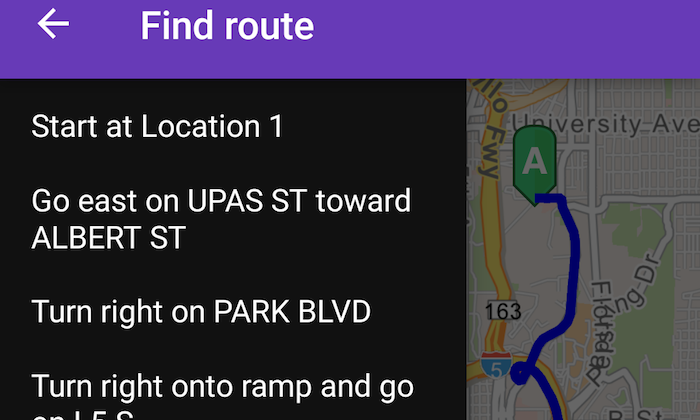This sample demonstrates how to get a route between two locations
For simplicity the sample comes with Source and Destination stops. You can click on the Navigation  Floating Action Button to get a route between the stops. Once a route is generated, the
Floating Action Button to get a route between the stops. Once a route is generated, the DrawerLayout is unlocked and you can view the direction maneuver as a list.
- DirectionManeuver
- Route
- RouteParameters
- RouteResult
- RouteTask
The sample creates a RouteTask from a URL and uses default RouteParameters from the RouteTask service to set up the stops. In order to get detailed driving directions, setReturnDirections is set true in the parameters. RouteTask.solveAsync is used to solve for route. The RouteResult is then used to create the route graphics and getDirectionManeuvers() on route result returns step-by-step direction list which is populated in the ListView.
// create RouteTask instance
mRouteTask = new RouteTask(getString(R.string.routing_service));
final ListenableFuture<RouteParameters> listenableFuture = mRouteTask.generateDefaultParametersAsync();
listenableFuture.addDoneListener(new Runnable() {
@Override
public void run() {
try {
if (listenableFuture.isDone()) {
int i = 0;
mRouteParams = listenableFuture.get();
// get List of Stops
List routeStops = mRouteParams.getStops();
// set return directions as true to return turn-by-turn directions
// in the result of getDirectionManeuvers().
mRouteParams.setReturnDirections(true);
// add your stops to it
routeStops.add(new Stop(new Point(-13041171.537945, 3860988.271378,
SpatialReferences.getWebMercator())));
routeStops.add(new Stop(new Point(-13041693.562570, 3856006.859684,
SpatialReferences.getWebMercator())));
// solve
RouteResult result = mRouteTask.solveAsync(mRouteParams).get();
List routes = result.getRoutes();
mRoute = (Route) routes.get(0);
// create a route graphic
Graphic routeGraphic = new Graphic(mRoute.getRouteGeometry(), route);
// add route graphic to the map
graphicsOverlay.getGraphics().add(routeGraphic);
// get directions
// NOTE: to get turn-by-turn directions Route Parameters should set
// returnDirection flag as true
List<DirectionManeuver> directions = mRoute.getDirectionManeuvers();
String[] directionsArray = new String[directions.size()];
for (DirectionManeuver dm : directions) {
directionsArray[i++] = dm.getDirectionText();
}
// Set the adapter for the list view
mDrawerList.setAdapter(new ArrayAdapter<>(getApplicationContext(),
R.layout.drawer_layout_text, directionsArray));
if (mProgressDialog.isShowing()) {
mProgressDialog.dismiss();
}
}
} catch (Exception e) {
Log.e(TAG, e.getMessage());
}
}
});